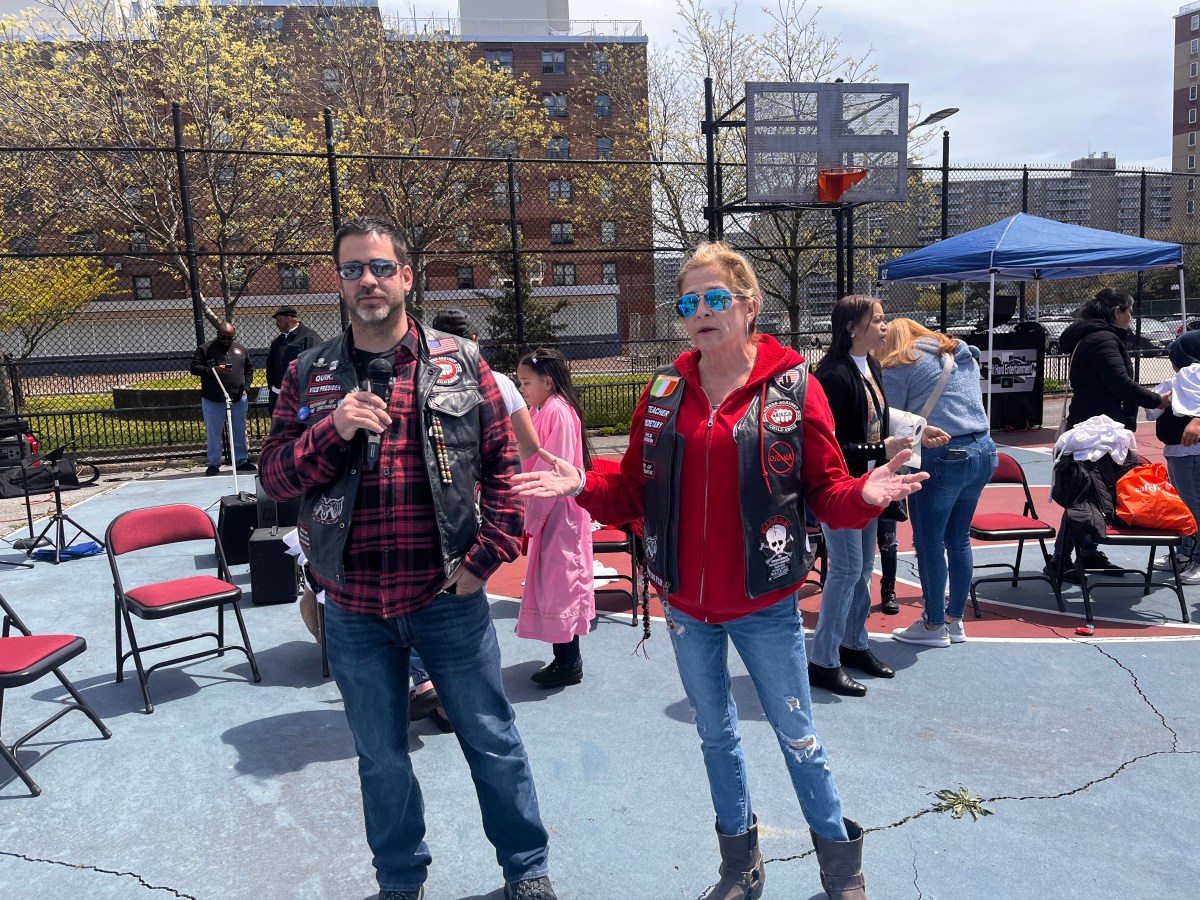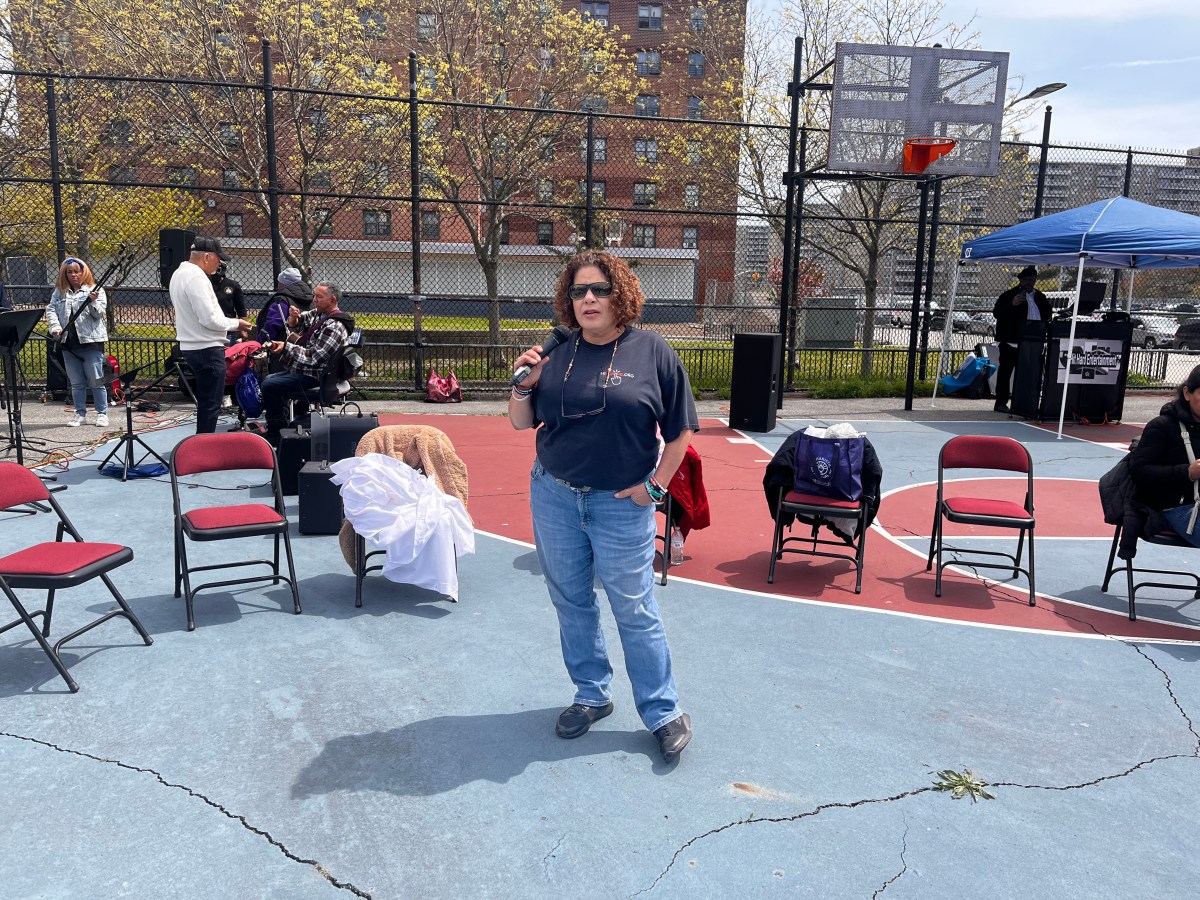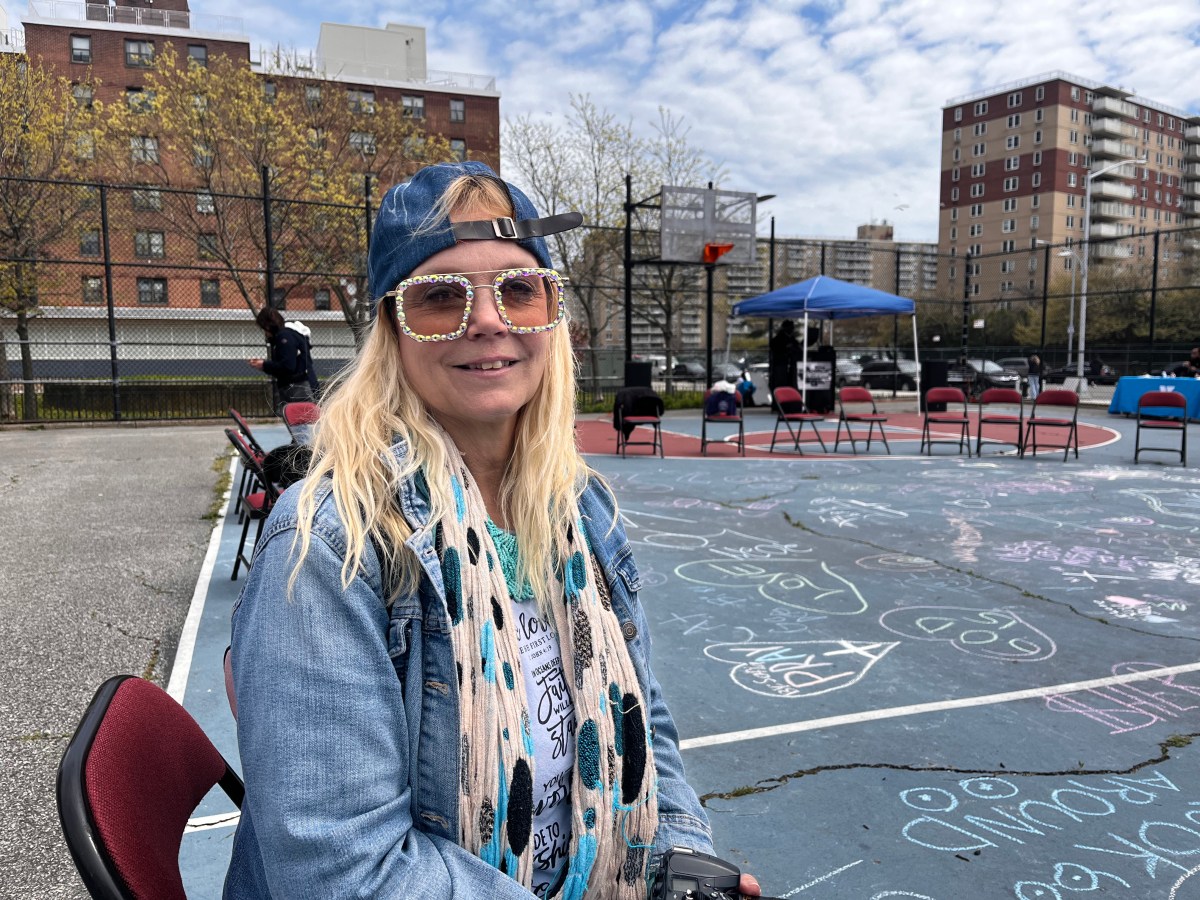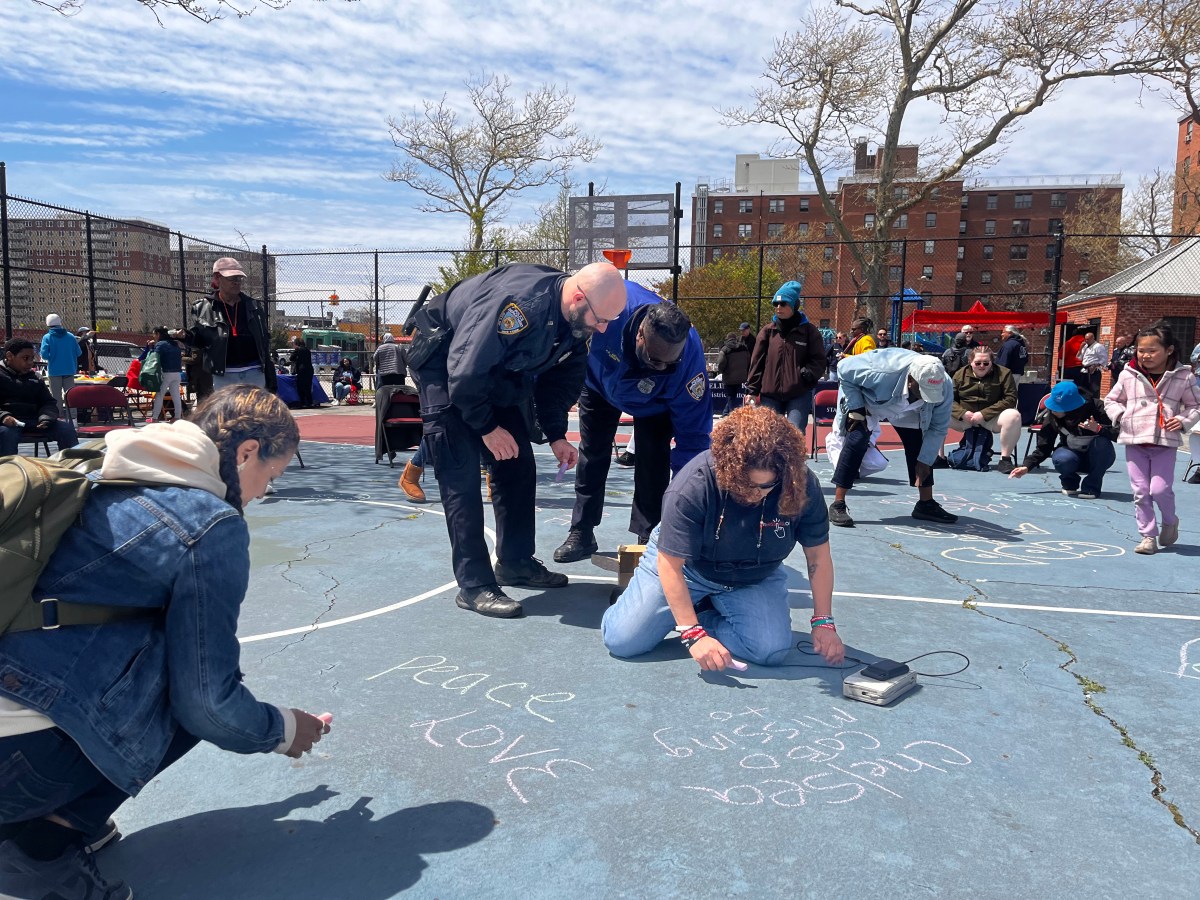On Saturday, Apr. 27, Far Rockaway community activist Theresa Racine hosted a Denim Day event at Hammel Playground, situated at Rockaway Beach Boulevard and Beach 84th Street.
Denim Day, which usually occurs on the last Wednesday of April, during Sexual Assault Awareness Month, serves as a day of action and awareness in support of domestic violence and sexual assault survivors. Participants wear jeans as a symbolic protest against the misconceptions surrounding sexual violence.
Racine, a longtime resident and advocate in Far Rockaway, dressed in embroidered jeans and bedazzled glasses, welcomed attendees to the event. The gathering drew dozens of community members, who came to listen to speeches from local government officials and activists focused on protecting vulnerable children and adults. The event featured remarks from representatives for Assemblymember Stacey Pheffer Amato (D-23) and Queens District Attorney Melinda Katz.
Paul King, the Republican challenger for Congress in District 5 and a resident of Belle Harbor, also attended Saturday’s Denim Day event. King expressed pride in the societal progress made in addressing sexual assault and victim blaming. He emphasized, however, that much more needs to be done to support survivors of sexual violence.

At the event, members of Bikers Against Child Abuse (BACA) spoke about their mission to assist children facing abuse. “It’s important to have an event today because you’re getting the awareness out there that these people did not know what BACA is. We’re here to empower children not to be afraid of the world in which they live. We’re here to empower them until they don’t need us anymore, so that they’re strong enough to be on their own,” explained a BACA member known by the road name “Teacher.”
BACA collaborates with state and local officials to create safe environments for abused children. They provide support by escorting children to court hearings, offering rides to school and helping them find temporary relief from their challenging environments. The children involved with BACA receive “road names” based on their hobbies and attributes and are given a vest with patches, symbolizing camaraderie and support.
The park was dotted with multiple resource tables, where residents could access information on mental health support, services for domestic violence survivors and internet safety, with materials provided by members of the FBI’s community outreach department. Community members also had the opportunity to participate in self-defense classes led by Moises Reyes from the Queens Community Justice Center and a local karate dojo.
Adding to the day’s activities, the Baby Jesus Choir of St Rose of Lima Church and the Far Rockaway Light House Community Choir performed an array of melodies in both Spanish and English. Additionally, Racine led a community activity where attendees wrote positive messages with chalk around the playground, enhancing the event’s atmosphere of support and empowerment.

Survivors Speak Out
During the Denim Day event, a few community members candidly shared their stories of surviving domestic violence and sexual assault.
Rose Marie, a Far Rockaway resident, gave an emotional testimony of how she survived sexual abuse from her father and grappled with the murder of her mother at the tender age of five. “My family members raised me. My church raised me, seniors in the community raised me, and so it’s very easy for me to give back what was given to me,” she said. Rose Marie urged parents to be vigilant to protect their children from predators and, at times, “ trust no one.”
“Protect your children at all costs,” she said. “All I have to say today is just let’s stand together and fight against sexual assault, fight against domestic abuse, fight against human trafficking.”

Brenda, 64, opened up about surviving sexual harassment in the workplace during her career as a stenographer. “I am a ‘Me Too’ survivor of sexual harassment,” she said. She started her career working at a law firm in the 1970s and faced sexual harassment from some of the lawyers and, later on, a doctor she worked with.
Brenda said she felt embarrassed at the time, adding that in the 1970s, there were no support movements or resources like “Me Too” to fight against sexual harassment and domestic violence issues. “I never said anything. I ran to alcohol and then to drugs to try to deal with the uncomfortability of it and the anticipation of it happening again and again,” she said.
She expressed happiness about the growing number of organizations today that are dedicated to supporting victims of domestic and sexual violence, as well as addressing mental health and addiction issues. “Now I speak out and reach out to my community, young and old, to let them know that they need to raise their voice. Never be afraid to speak up and speak out, as someone is there to help and listen,” she said. Brenda also shared that she has undergone rehabilitation and received support from a therapist, her community and various organizations.

Also at the event was Rose Cobo, mother of Chelsea Michelle Cobo, who went missing from her Brooklyn home in 2016. Since then, Cobo has been relentlessly searching for her daughter and has become an activist advocating for missing people and victims of human trafficking. Chelsea Cobo’s story was featured in a Hulu series entitled “Missing,“ ABC7’s new series investigating cold cases of people who have vanished without a trace. “Being stuck with an ambiguous loss is torture. I’m free, but I’m in prison,” said Cobo.
Cobo also brought attention to an app she is developing called “911 Missing.” Cobo said the app will be out within six weeks and revolutionize how people search for missing loved ones. “In addition to your posters, [alerts] will be able to hit your phone,” she said. “We’re just going to allow people who want to share their family that’s missing to go on the app, put the picture, and, if other people have the app, you will get a signal, as well as all law enforcement,” she said.

Her story to tell
Racine, 58, stands at the heart of the Denim Day event, drawing from her own profound experiences of surviving abuse to fuel her role as a community advocate. As a child, she endured sexual abuse from her stepfather, who was married to her adoptive mother. At 14, overwhelmed by her circumstances, she ran away. The pattern of abuse continued into her adulthood, involving inappropriate behavior from a trusted pastor and an abusive relationship with a former partner. Additionally, her daughter fell victim to sexual trafficking in 2002, marking years of what Racine describes as “enduring.”
Despite these challenges, Racine’s faith has been a cornerstone of her resilience. “My faith is so strong,” she declared. “I love the Lord.”
Transforming her pain into purpose, Racine has been an active force in raising awareness about sexual assault, domestic violence and sex trafficking within her community. Despite dealing with her own health issues, she has devoted herself full-time to activism. Recently, she celebrated graduating from the NYPD Citizens Academy. “What’s good is that I’m changing lives and I know I am,” Racine shared. “There are people who don’t talk about their story, but they have a story. So, you know, this is why I do everything I do.”



































